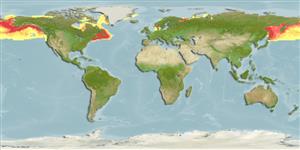Classification / Names
Common names from other countries
Main reference
Size / Weight / Age
Max length : 35.6 cm TL male/unsexed; (Ref. 1998); max. reported age: 7 years (Ref. 52222)
Length at first maturity
Lm 19.5 range ? - 19.8 cm
Environment
Marine; freshwater; brackish; pelagic-oceanic; anadromous (Ref. 51243); depth range 0 - 425 m (Ref. 58426), usually ? - 150 m (Ref. 96339)
Climate / Range
Temperate, preferred 2°C (Ref. 107945); 73°N - 41°N (Ref. 26213)
Distribution
Short description
Dorsal
spines
(total): 0;
Dorsal
soft rays
(total): 8;
Anal
spines: 0;
Anal
soft rays: 12 - 16;
Vertebrae: 58 - 70. Body elongate, laterally compressed, greatest depth at anterior of dorsal fin origin. Head moderate; eye moderately large; snout elongate, pointed. Mouth large; lower jaw protruding, maxillary extending to middle of eye or beyond, well toothed on vomer, palatine, pterygoid, basibranchial, dentary, maxillary, and tongue. Teeth specially enlarged on tongue and front of vomer. Body color is pale green on back, with purple, blue, and pink iridescent reflections on the side when freshly caught.
IUCN Red List Status (Ref. 115185)
Threat to humans
Harmless
Human uses
Fisheries: commercial; gamefish: yes
Tools
Special reports
Download XML
Internet sources
Estimates of some properties based on models
Phylogenetic diversity index
PD50 = 0.5625 many relatives (e.g. carps) 0.5 - 2.0 few relatives (e.g. lungfishes)
Trophic Level
3.0 ±0.0 se; Based on diet studies.
Resilience
Medium, minimum population doubling time 1.4 - 4.4 years (K=0.31; tm=2-6; tmax=6; Fec=8,500)
Vulnerability
Moderate vulnerability (38 of 100)
Price category
